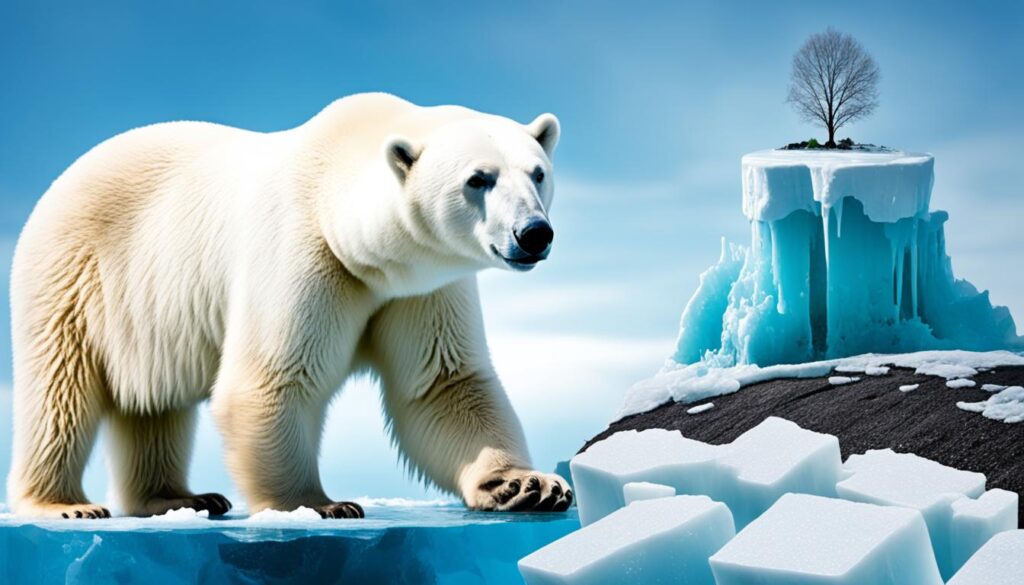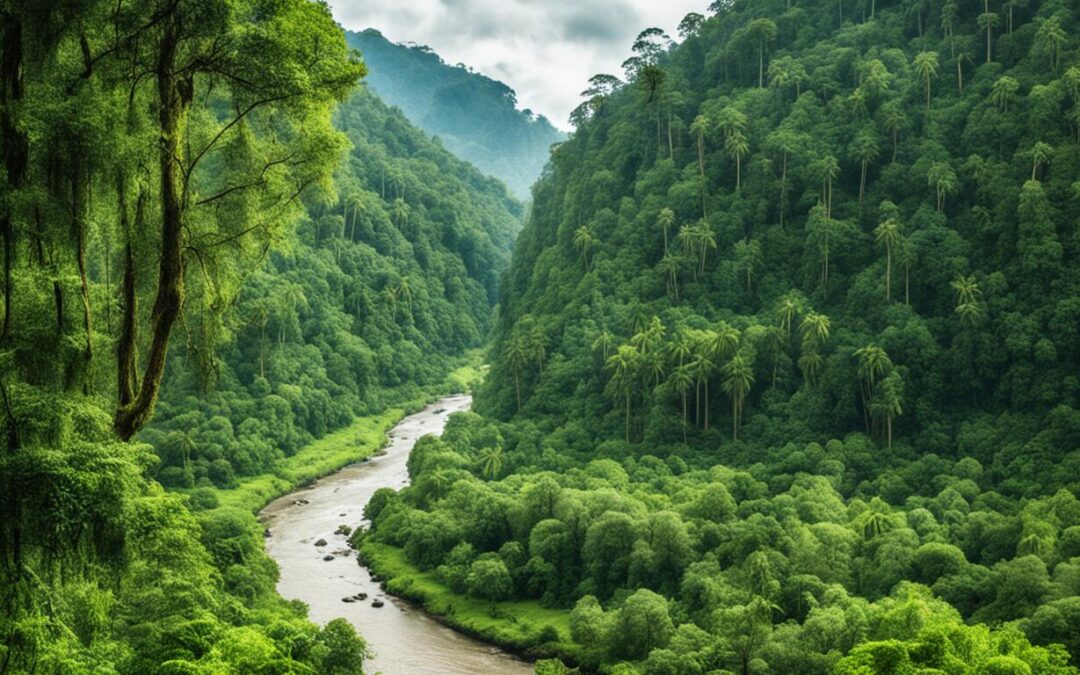In a world where climate change is becoming an increasingly pressing issue, it is vital to understand how ecosystems are being affected and what measures we can take to mitigate these impacts. Climate change poses significant challenges to the delicate balance of our planet’s ecosystems, threatening the diverse species and habitats that rely on stable environmental conditions.
Climate change affects ecosystems in multiple ways, with consequences ranging from species migration to shifts in habitats. The changing climate disrupts the timing of seasonal life-cycle events for many species, leading to asynchronies and increased vulnerability. Rising temperatures result in range shifts for North American species, impacting their distribution and even causing local extinctions.
Furthermore, climate change can disrupt food webs, altering ecosystem dynamics and affecting multiple species within these intricate networks. Ecosystems may also lose their ability to buffer extreme events such as wildfires and floods, due to the combined effects of climate change and human modification. Additionally, changing ecological conditions facilitate the spread of pathogens, parasites, and diseases.
It is crucial to recognize that climate change, along with habitat destruction and pollution, contributes to species extinction. This combination of factors poses a grave threat to the delicate balance of ecosystems worldwide.
However, all hope is not lost. Through comprehensive mitigation efforts, we can make a difference in mitigating the impacts of climate change on ecosystems. By reducing greenhouse gas emissions and stabilizing their levels in the atmosphere, we can minimize further interference with Earth’s climate.
Conserving biodiversity and protecting sufficient habitat are integral parts of climate change mitigation, as they help species and ecosystems adapt to changing conditions. Mitigation efforts require global cooperation and the development of comprehensive climate adaptation planning.
In the upcoming sections of this article, we will explore the impacts of climate change on ecosystems, delve into mitigation strategies, discuss adaptation measures, and highlight NASA’s role in climate change research. Together, let’s strive towards a sustainable future where our ecosystems thrive, even in the face of climate change.
Impacts of climate change on ecosystems
Climate change has significant impacts on ecosystems, leading to observable changes in species and environmental dynamics. These impacts not only affect the delicate balance of ecosystems but also pose challenges for the sustainability of our planet.
One of the notable impacts of climate change is the alteration of ecosystem productivity. Rising temperatures and changing precipitation patterns can disrupt natural cycles, affecting the growth and reproduction of plants and animals. This disruption can have cascading effects on the entire food web, impacting both primary producers and consumers.
Another consequence of climate change is the exacerbation of invasive species. As climates shift and become more favorable for certain species, invasive plants and animals can rapidly spread and outcompete native species. This can lead to a loss of biodiversity and disrupt the balance of ecosystems.
Shifts in species’ ranges and abundance are another visible impact of climate change. As habitats change, some species may struggle to adapt and face challenges in finding suitable areas to live and reproduce. This can result in range contractions, extinctions, or the emergence of entirely new ecological communities.
The impacts of climate change on ecosystems are not isolated; they often interact with other stressors. Pollution, habitat destruction, and overexploitation of resources can compound the effects of climate change, further disrupting ecosystem processes and services.
Furthermore, vulnerable ecosystems are particularly at risk of transformative ecological change due to climate change. For instance, western North American forests and Caribbean coral reefs are both highly susceptible to the impacts of rising temperatures and ocean acidification. These ecosystems may experience irreversible damage, leading to significant consequences for biodiversity and ecosystem functions.
| Impacts | Examples |
|---|---|
| Alteration of ecosystem productivity | Changes in plant growth, reproductive cycles |
| Exacerbation of invasive species | Rapid spread of non-native plants and animals |
| Shifts in species’ ranges and abundance | Loss of suitable habitat, range contractions |
| Interaction with other stressors | Pollution, habitat destruction, overexploitation |
| Vulnerable ecosystems at risk | Western North American forests, Caribbean coral reefs |
Mitigation of climate change
To address the urgent challenge of climate change, effective mitigation strategies are crucial. Mitigation involves reducing greenhouse gas emissions and stabilizing their levels in the atmosphere. By taking proactive measures to mitigate climate change, we can avoid significant interference with Earth’s climate and safeguard essential ecosystems and food production.
One key aspect of mitigation is the conservation of biodiversity and sufficient habitat. Preserving and restoring natural ecosystems play a vital role in helping species and ecosystems adapt to the impacts of climate change. By protecting and restoring habitats, we can provide crucial resources and refuge for vulnerable species and mitigate the potential consequences of climate change on their survival.
Global cooperation is paramount for successful mitigation efforts. Climate change is a global issue that requires collective action and collaboration among nations, organizations, and individuals. By working together, we can develop and implement comprehensive climate adaptation plans that integrate mitigation strategies and promote sustainable practices.

Protecting Ecosystem Services through Mitigation
Mitigation efforts not only aim to reduce greenhouse gas emissions but also play a crucial role in preserving the valuable services ecosystems provide. Ecosystems act as natural buffers against climate change impacts, such as regulating water availability, preventing soil erosion, and sequestering carbon. By mitigating climate change, we can help maintain the functions and services provided by ecosystems and mitigate the cascading effects on human livelihoods and well-being.
Furthermore, mitigation strategies contribute to the overall resilience of ecosystems, helping them adapt to changing climatic conditions. By reducing the pressure on ecosystems through mitigation, we can support their capacity to withstand and recover from climate-related stressors, ultimately contributing to the long-term sustainability of our planet.
Adaptation to climate change
In the face of climate change, adaptation is key to mitigating its effects and safeguarding our communities and ecosystems. Local governments and communities play a crucial role in spearheading adaptation efforts, implementing strategies to adjust to both current and anticipated changes in the climate.
There are various adaptation strategies that can be employed to address the challenges posed by climate change. These include:
| Adaptation Strategies | Description |
|---|---|
| Building flood defenses | Constructing and reinforcing infrastructure to protect against floods and rising sea levels, ensuring the safety of communities and minimizing property damage. |
| Planning for extreme weather events | Developing comprehensive emergency response plans to mitigate the impacts of hurricanes, heatwaves, droughts, and other extreme weather events. |
| Improving water storage and management | Implementing sustainable water management practices, such as rainwater harvesting, to ensure a reliable water supply amidst changing precipitation patterns. |
| Developing new crop varieties | Exploring and adopting climate-resistant crop varieties that are better suited to withstand temperature extremes, water scarcity, and changing growing seasons. |
Integrating climate adaptation planning into natural resource management is essential for comprehensive and effective strategies. By considering the potential impacts of climate change on our ecosystems and resources, we can make informed decisions that promote resilience and sustainability.
NASA’s role in climate change research
NASA plays a crucial role in advancing our understanding of climate change through its extensive scientific research and data analysis. As a leading institution in Earth science, NASA provides valuable insights into the impacts of climate change on our planet.
By collecting and analyzing data from satellites, aircraft, and ground-based observations, NASA contributes essential information to the global community, including policymakers and decision-makers. This data helps in formulating effective strategies to mitigate and adapt to the changing climate.
Collaborating with other agencies and being part of the U.S. Global Change Research Program, NASA actively engages in addressing climate change. However, it is important to note that NASA’s focus is on Earth science and understanding the effects of climate change, rather than setting policy or recommending specific solutions.
Through its dedication to ongoing research and the provision of scientific data, NASA’s contributions have a direct impact on the development of effective mitigation and adaptation strategies to combat the challenges posed by climate change.

